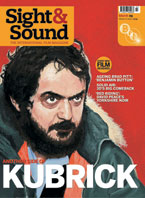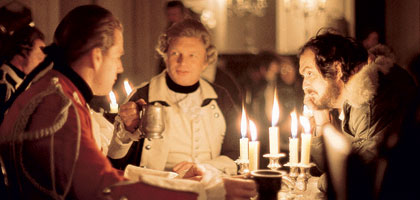Primary navigation


'Barry Lyndon' takes its inspiration from Thackeray's source novel. But in Kubrick's hands the tone - and the hero - are transformed. By Kim Newman
One of the mysteries of Stanley Kubrick's career is why he seized upon William Makepeace Thackeray's The Memoirs of Barry Lyndon for adaptation, since the novel is most notable for its use of a literary device Kubrick was constitutionally unable to embrace - the unreliable narrator. In Kubrick's films, narrators (like directors) are authoritative. Humbert Humbert (James Mason) of Lolita, from Nabokov, and Alex DeLarge (Malcolm McDowell) of A Clockwork Orange, from Anthony Burgess, tell their own stories with vivid, revelatory narration. Though they talk of much that is to their discredit, they are honest chroniclers; they may work mendacious wheedles on other characters, but they do not lie to us.
The first version of Thackeray's novel was serialised as The Luck of Barry Lyndon: A Romance of the Last Century. By Fitz-Boodle in Fraser's Magazine in 1844, but was revised in 1856, whereupon its title became (deep breath): The Memoirs of Barry Lyndon, Esq., of the Kingdom of Ireland. Containing an Account of his Extraordinary Adventures; Misfortunes; His Sufferings in the Service of His Late Prussian Majesty; His Visits to Many of the Courts of Europe; His Marriage and Splendid Establishments in England and Ireland; and the Many Cruel Persecutions, Conspiracies and Slanders of Which He Has Been a Victim. In the earlier version, the narrative of Barry Lyndon (né Redmond Barry) - which purports to have been written as he is dying in Fleet Prison - is mediated by footnotes from 'Fitz-Boodle', a fictional editor who contradicts the autobiographer on points of fact. In the revised text, Fitz-Boodle is dropped: the novelist has gained confidence that readers will perceive a different picture behind Barry's statements such as: "For the first three years I never struck my wife but when I was in liquor."
Thackeray's Barry is as much of a monster as Alex, and as murderous a terror to his family as Jack Torrance in The Shining. He is a bully, swindler, looter, card-sharp, murderer, cad, spy, deserter, snob, drunkard, whiner, braggart, philistine and rake. He betrays every friend or relation, considers others' misfortunes only insofar as they affect himself and becomes a low-rent gothic villain as his captive wife pens pleas for rescue in lemon juice, between the lines of letters to her milliner. As Fitz-Boodle notes, he is also embarrassingly devoted to his own reputation, and any possible admission of low character or motive is followed by "a duel, in which he is victorious".
Kubrick, not usually one to spare his characters, trims away most of Barry's outright villainies and adds incidents that show him in a more sympathetic, honourable light - most notably in the climactic duel, when Barry harmlessly discharges his shot after the pistol of his opponent and stepson, Lord Bullingdon (Leon Vitali), has misfired; a mercy Bullingdon repays by shooting Barry in the leg. The film idealises relationships Thackeray views with cynicism, like Barry's love for his fiercely protective mother, his flighty cousin Nora, his countryman and gaming patron the Chevalier de Balibari (a long-lost uncle in the novel) and his short-lived, angelic son Bryan.
As played by Ryan O'Neal - as big a name in box-office terms in 1975 as Tom Cruise was at the time of Eyes Wide Shut - Kubrick's Barry drifts through the 18th century with disinterest, like Keir Dullea's wide-eyed astronaut in 2001: A Space Odyssey. Some critics decried O'Neal's performance as inexpressive, perhaps failing to appreciate the way he underplays - and the way Kubrick films - Barry's several tearful breakdowns and desperate hugging of parental substitutes or lost women and children. Now that O'Neal's major hits (Love Story, What's Up, Doc?) are rarely revived, his screen reputation rests on Barry Lyndon, a film which was not an immediate commercial or critical success, but whose reputation has grown apace with its widening influence - within a year or two, Ridley Scott was pillaging it wholesale for tonal notes, players, costuming and staging for his debut The Duellists.
Few Kubrick films have been well, or even usefully reviewed on their original release (Philip Strick's notice of 2001 in Sight & Sound is an honourable exception) because they need a couple of viewings to percolate. Coming after the controversial, futurist A Clockwork Orange, which has many similarities in its plot arc with Barry Lyndon, the 'new Kubrick' seemed tame in its retreat to history, to proper buttons on uniforms, to beautiful still lives and a respectable, little-read classic source. It remains the least-seen of his major works, but its stock is rising - and it may yet come to be classed as the most rewarding of Kubrick's films. Scorsese has called it: "one of the most emotional films I have ever seen".
Kubrick certainly put his stamp on the material. Thackeray's Europe is marked by bloody, corrupt politics, but Kubrick has no room for terrorist strikes against Irish landlords or German princes commissioning the murders of inconstant female dependents, or even Barry's self-serving term as a Member of Parliament. Thackeray's Barry yarns non-stop in the manner of George MacDonald Fraser's Flashman; O'Neal's Barry is reticent, and only tells stories to his son, most affectingly on the boy's deathbed. For the novelist, the duels are divertissements, opportunities for Barry to misrepresent himself as a fine fellow; Kubrick depicts a series of ritual conflicts, which the hero loses even if he happens to win. Barry's adventures in life start with the death of his father in a duel (in the novel, he drops dead at the races), and his wanderings begin when he prevails in a fake duel with Captain Quin (Leonard Rossiter), his rival for his cousin, and has to flee Ireland. Enlisted in the British army, he fights bare-knuckled with a huge bruiser (Pat Roach). Then, in alliance with the Chevalier (Patrick Magee), he collects gambling debts with a sword. His chastisement of the shrill Bullingdon prompts a campaign of insolence that escalates into a horrific beating administered in public on slippery wood floors, a scene that snaps cinematographer John Alcott out of poised, perfect, tracking shots into a flurry of ugly, close, handheld work. Last is the irony-laden duel with Bullingdon, as a good turn earns Barry a crippling reward. Dialogue exchanges, with a bespectacled highwayman or a canny German officer, are similarly cut-and-thrust, and tend to find Barry the loser.
Throughout the mesmeric length of the film, Michael Hordern's narration is a constant presence, at once soothing and peppery. (Hordern's tone of voice and precise, novelistic suggestiveness are the model for the near-identical manner adopted recently by John Hurt as the narrator of Dogville and Perfume.) Writing his screenplay without a credited novelist to assist him, Kubrick simply tweaks sentences from Thackeray so that Barry's self-exposing asides become the objective, mildly regretful observations of, basically, God. A note about a soldier's widow who is, like nearby towns, "taken and retaken several times" during a campaign is self-justifying waffle in Barry's mouth, but coming from Hordern, a more authoritative voice even than the carping Fitz-Boodle, it is a mean-spirited writing-off of a minor character.
Even the celebrated epilogue is a lift from an early passage in the novel in which Barry smugly assesses the troubled times of ancestors whose errors he is about to repeat. Here, despite his reputed misanthropy, Kubrick is diffident and generous where Thackeray was merciless and unforgiving: "It was in the reign of George III that the aforesaid personages lived and quarrelled; good or bad, handsome or ugly, rich or poor, they are all equal now."
'Barry Lyndon' is screening in an extended run as part of the Stanley Kubrick retrospective at the BFI Southbank, and will then tour selected cinemas nationwide